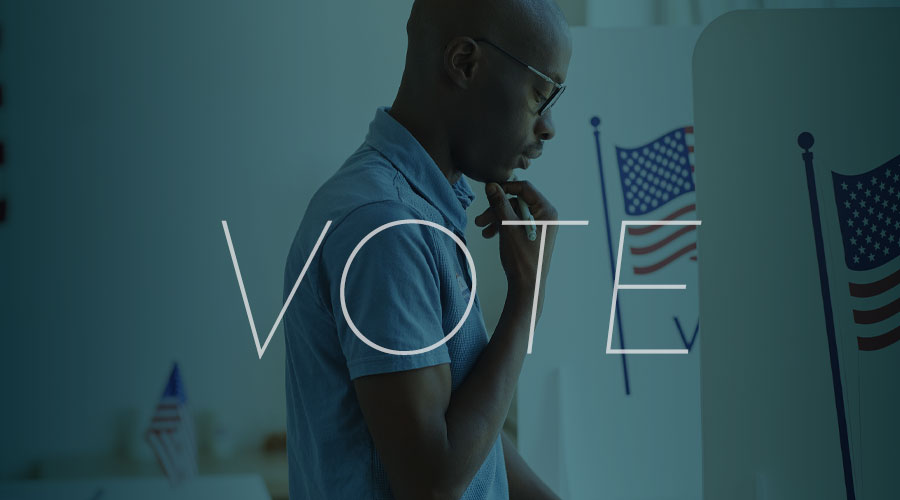Robert F. Smith, on Sunday, Oct. 25, during the virtually-held Voting Commitment Ecumenical Service, The Conference of National Black Churches’ (CNBC) called on all Black voters to participate in the 2020 election.
Smith’s message and the overarching theme of the video service was to rally Black voters to turn their outrage over miscarriages of justice into civic action by practicing their right to vote.
“[Let] nothing stand in the way of having our voices heard and building the country we deserve,” Smith said, summarizing his non-partisan call to rally voters which delved into civil rights history. His historical perspective connected civil rights movements past and present, emphasising the importance of the vote so that the great diversity of Black perspectives could be recorded.
The service was hosted by African Methodist Episcopal Church Senior Bishop Adam Jefferson Richardson, Jr. and the Rev. Dr. W. Franklyn Richardson, chairman of The CNBC and senior pastor of Grace Baptist Church in Mount Vernon, N.Y., delivered the featured sermon on the topic of self empowerment. The Conference included the words of faith leaders from across the country including:
- Senior Bishop Lawrence L. Reddick, III, of the Christian Methodist Episcopal Church
- Senior Pastor the Rev. Dr. Freddie Haynes of Friendship-West Baptist Church
The Rev. Dr. Richardson, after reading from the Gospel of John Chapter 5 verse 8, exhorted congregants to “rise” and take on their responsibility to themselves and their communities by getting out the vote.
“We cannot let our lack of participation be the reason our country continues in the way it is now going,” Richardson said. “We must see it as a mandate from heaven that we participate in our own empowerment; that we tap into what is in us to free us.”
Civil rights leader and activist the Rev. Al Sharpton, whose voice joined with The Rev. Dr. Richardson and other leaders in the streamed service, reminded viewers of the sacrifices made by “forefathers” who left as their legacy the right for Black Americans to vote.
Sharpton introduced Smith as a man who lent his support to social justice causes away from the limelight, and the man who freed Morehouse students from debt as a means to create a regenerative cycle of Black wealth and empowerment.
Smith’s contribution was a solemn historical perspective connecting Selma to the current moment.
Robert F. Smith Evokes Selma and Civil Rights History
Robert F. Smith tapped into his knowledge of the less well-known heroes of civil rights history during his portion of the service, by referencing the story of Jimmie Lee Jackson, a 26 year-old African American man who was murdered during a peaceful protest to demand voting rights in Marion, Mississippi, in 1965.
Jackson, according to Smith and historians, tried numerous times to register to vote, but was repeatedly denied. His death at a suffrage protest, while protecting his mother and 82-year-old grandfather is thought to have contributed to the impetus that inspired the now famous Selma marches, which in turn led to the ratification of the Voting Rights Act of 1965.
“Every time we cast our ballot, we quietly honor his legacy,” Smith said.
Bishop Jefferson-Snorton and Smith both spoke to the questions they have heard in their communities about whether or not voting matters.
Jefferson-Snorton quoted former President Barack Obama who said in September 2016, ”There’s no such thing as a vote that doesn’t matter. It all matters.”
When did Black People Get the Right to Vote?
According to historians, following the defeat of the south and the end of the Civil War in 1865, the U.S. Congress passed a series of Reconstruction Acts beginning in 1867 which brought the vote to Black men in most former Confederate states.
In 1870 the 15th Amendment was ratified which guaranteed the right to vote regardless of race, color or previous forced enslavement.
This period and the years that followed is called the Reconstruction Era. According to Henry Louis Gates Jr., Alphonse Fletcher University Professor and Director of the Hutchins Center for African and African American Research at Harvard, the era was “a short-lived time” during which approximately 2,000 Black men were voted into public office by their constituents.
In the 1890’s, voting rights for Blacks were blocked once more by ‘white supremacists’ who used methods including intimidation tactics and literacy tests to disenfranchise African Americans.
To learn more about civil rights history and the Black vote, tune into the Webby-award winning history podcast Black History in Two Minutes, for which Smith is executive producer. Voting rights episodes include:
Smith ended his talk on Sunday echoing words spoken by Obama at Temple University in 2014 and repeated by an organizer at the most recent Women’s March on Oct. 17, ”Vote. Vote. Vote. Vote. Vote.”






